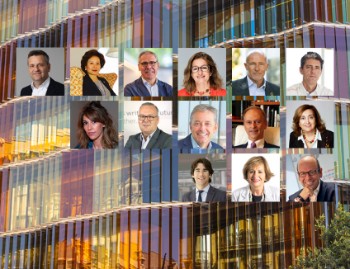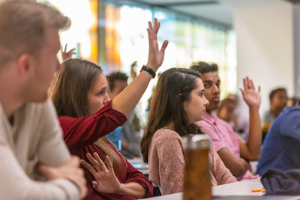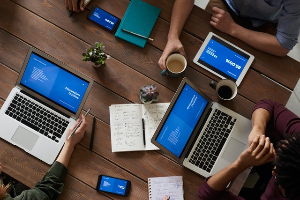The EADA Board of Trustees on the challenges posed by Covid-19
 The Board of Trustees of the EADA Private University Foundation, which oversees the Steering Committee of EADA Business School and includes highly experienced CEOs from the business world, has sent a message of optimism to the education community. Despite the complex situation currently facing companies, entrepreneurs, CEOs and all those in the business community due to the Covid-19 crisis, the members of the Board agree that it is time for action, a reassessment of processes and for reinvention, all of which will enable us to confront new challenges.
The Board of Trustees of the EADA Private University Foundation, which oversees the Steering Committee of EADA Business School and includes highly experienced CEOs from the business world, has sent a message of optimism to the education community. Despite the complex situation currently facing companies, entrepreneurs, CEOs and all those in the business community due to the Covid-19 crisis, the members of the Board agree that it is time for action, a reassessment of processes and for reinvention, all of which will enable us to confront new challenges.
As Margaret Chen, Honorary President of China Club Spain and founder of Optimus Horizon explains, “In Mandarin the meaning of the word crisis includes the concept of opportunity”. By applying it to the context of current uncertainty, “the need to find a global exit solution to this crisis, on different paradigms, has forced companies to revise the way they relate to their employees, stakeholders and institutions”. In John Rigau’s opinion, Vice-president and General Counsel at PepsiCo Western Europe, it has therefore become “a unique opportunity to strengthen networking” and “learn how to reinvent ourselves and acquire knowledge that will enable us to face new challenges, the majority of which are still unknown to us”.
A situation like the present one can also make us become more flexible and adaptable to the changing environment. Imma Amat, President of the Board of Directors of Amat Immobiliaris, explains that, “Everything has changed and what was viable before now probably won’t be from now on, which is why companies have to reassess their business model”. Marc Gómez, President and CEO of ABB Spain and Portugal, points to how “We now see what it really means to experience a VUCA environment (volatility, uncertainty, complexity, ambiguity)” and adds that, “We have learnt that speed is essential in crisis situations. The sooner you react, the sooner you can redirect the situation and minimise losses. Over the lockdown period, we have discovered that we interact with more clients via 3 webinars than in a prominent trade fair and we generate more leads with these actions than during a traditional fair”.
Jordi Pursals, President of the Board of Trustees of the EADA Foundation and CEO of PACCOR Iberia, highlights what we have achieved over recent weeks and how it will affect business strategy in the short to medium term. “The reduction in mobility has had a positive impact on the environment, remote working has given many people the opportunity to balance their personal and professional lives, as well as considerably reduce business travel. It has also underlined the responsibility companies have with regards to their social impact, by increasing research and the use of renewable energy”.
Talent management and digital transformation
 The Foundation’s trustees also raised talent management as the first of two key issues. According to César Molins, CEO of AMES Group Sintering, “if there are no clients, there is no company, but if there are no people, there is even less. The company is neither the owner nor its shareholders, it is its people and it is important to always look after them”. For MUR & PARTNERS founder, Carmen Mur, “it is now more important than ever to surround ourselves with people who can contribute transformative skills, maximum performance and ability to adapt to the new environment”. Guayente Sanmartín, General Manager and Global Head of Large Format Design Printing at HP, agrees that “it is important to put people first and motivate them by generating trust and credibility with clear and concise messages, helping them to train up and prepare for the future”. Josep M. Martorell, Associate Director of Barcelona Supercomputing Center, insists on “talent investment being the best asset of an organisation, whatever the future may hold”.
The Foundation’s trustees also raised talent management as the first of two key issues. According to César Molins, CEO of AMES Group Sintering, “if there are no clients, there is no company, but if there are no people, there is even less. The company is neither the owner nor its shareholders, it is its people and it is important to always look after them”. For MUR & PARTNERS founder, Carmen Mur, “it is now more important than ever to surround ourselves with people who can contribute transformative skills, maximum performance and ability to adapt to the new environment”. Guayente Sanmartín, General Manager and Global Head of Large Format Design Printing at HP, agrees that “it is important to put people first and motivate them by generating trust and credibility with clear and concise messages, helping them to train up and prepare for the future”. Josep M. Martorell, Associate Director of Barcelona Supercomputing Center, insists on “talent investment being the best asset of an organisation, whatever the future may hold”.
The second issue concerns the need for digitalisation in companies, which during confinement has highlighted the difference between organisations. According to Marc Gómez, “although the new post-Covid scenario will be full of uncertainties, we do know that it will be a lot more digital, especially in B2B, where the client-supplier relationship has changed”. Guayente Sanmartín talks about agile innovation, “we need innovation to be able to move forward. It must be agile and flexible as we have seen how market needs can change from one day to the next”.
A new style of leadership
 All of these new challenges imply a new style of leadership which is completely different to that which existed before Covid-19. According to Luis Pardo, CEO of SAGE in Spain and Portugal “Now more than ever, we need leaders with determination, analytical skills and future vision who can maintain sustainable business models with people at the centre of all activity and results”. For Alberto Ojinaga, CEO of DESIGUAL, “Traditional methods are no longer viable. We need to visualise the worst-case scenarios and anticipate all situations”. In his opinion, “a late decision and a weak response are mistakes we can no longer afford”.
All of these new challenges imply a new style of leadership which is completely different to that which existed before Covid-19. According to Luis Pardo, CEO of SAGE in Spain and Portugal “Now more than ever, we need leaders with determination, analytical skills and future vision who can maintain sustainable business models with people at the centre of all activity and results”. For Alberto Ojinaga, CEO of DESIGUAL, “Traditional methods are no longer viable. We need to visualise the worst-case scenarios and anticipate all situations”. In his opinion, “a late decision and a weak response are mistakes we can no longer afford”.
Guayente Sanmartín also stresses “the current importance attached to leaders understanding which abilities and skills are needed to face these challenges”. To do this, she adds, “companies must have an upskill plan in place for their employees, as the need for flexibility and transversal skills will require them to have training”. Carles Grau, CEO of Mobile World Capital also underlines the importance of socially responsible leadership. “We need to work on social impact projects with objectives that transcend the economic factor and are truly transformational”.
According to Marta Reynal-Querol, ICREA Research Professor, Professor of Economics at the UPF and Director of IPEG, “at times of crisis like this one, the lack of leadership is a major handicap as it accentuates the difference between those companies and institutions that can reinvent themselves and recover quickly and those that may end up disappearing”.
Pere Vallès, CEO of EXOTICCA advises us to, “prepare for the worst and hope for the best. Today’s leaders should be cautious but also stay optimistic as we will overcome this crisis”.
